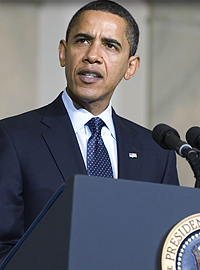| Obama Lectures Carmakers on How to Run a Business |
 |
|
By Ashton Ellis
Wednesday, August 17 2011 |
It turns out that all the U.S. auto industry needs to regain its dominance is an Econ 101 lecture from the most famous professor-turned-politician. Let’s consider some of his insights. “When I came into office they were talking about the liquidation of GM and Chrysler, and a lot of folks said you can’t help them, and it’s a waste of the government’s money to try and help them,” President Barack Obama said Monday during his Midwestern bus tour. “But what I said was, we can’t afford to lose up to a million jobs in this country, particularly in the Midwest.” Insight #1: Taxpayer money is really “the government’s money.” This must mean that those who run the government – not those who pay the taxes – get to decide whom to help. This is especially true when a million union jobs could be lost. The professor-president then claimed credit for “turning around” the U.S. auto industry, and offered advice on how to be competitive in the free market. “[Government bailout recipients General Motors and Chrysler] are gaining market share for the first time in years, but what we said was, ‘If we are going to help you, then you have also got to change your ways.’” Insight #2: Gaining market share is not the mark of a successful business. Following the orders of your government subsidizers is. Just in case carmakers don’t know where to start, Obama declared the only acceptable way forward: “You can’t just make money on SUVs and trucks. There is a place for SUVs and trucks, but as gas prices keep going up, you have to understand the market. People are going to try to save money.” Insight #3: High gas prices do not indicate a problem with the supply of gasoline, but with the supply of cars. Since the supply of gasoline cannot be increased (wink, wink to the Green Peace members in the audience), we must mandate a change in the types of cars people can drive. This insight implies a projection, or in economic terms, a forecast: The market for automobiles in 2011 is remarkably smaller than it was for the preceding 100 years. In fact, it will be dominated by small cars that sacrifice safety and flexibility for a level of fuel efficiency that has never been achieved. How does the professor-president know so well what car consumers want now and in the future? For starters, he is radically restricting the market with onerous new requirements that will force producers and consumers to pay more for less. Along with the lecture comes the disclosure that the White House strong-armed the auto industry into accepting drastically higher fuel efficiency standards on light-duty trucks and cars. Another product of backroom dealing brought the first-ever fuel efficiency standards for heavy-duty trucks and buses – a move that will undoubtedly make industrial and commercial hauling much more expensive. This brings us to another of Obama’s economic insights, this one implied. Insight #4: Good economics – and a sustainable business model – can be dictated into being using the wish-list of the environmental left. For those worried about a final exam, just remember this simple formula: Whatever is good for liberal bureaucrats is good for the American economy. At least the president practices what he professes. He claimed ObamaCare’s maze of mandates and anti-market forces would reduce the cost of healthcare. (To even get close will require Obama’s cost-cutting appointees to the Independent Payment Advisory Board to ration care by denying treatment to patients deemed unworthy.) The president’s other horrendous policies – Dodd-Frank’s capital-killing financial regulation, the Recovery Act that failed to stimulate anything other than public employee unions and arbitrarily awarding oil drilling permits to benefit states he likes – all share the same trait: an unwavering belief in Barack Obama’s ability to make better decisions than the free market. To be clear, Americans afflicted by a subsidy-fueled recession are not clamoring for more expensive investment options, healthcare or cars. They want an economy that is growing, and a tax and regulatory scheme oriented to that end. The most obscured aspect of President Obama’s counter-intuitive thinking is the reality that public policy choices involve trade-offs. To save “a million jobs,” Obama spent $60 billion bailing out Chrysler and GM. (As of June, the Treasury Department’s own estimate pegs the loss to taxpayers to at least $14 billion.) No matter how much it hurts to lose employment, you don’t need to be a college professor to know that the nation cannot afford that kind of jobs strategy. |
Related Articles : |
























